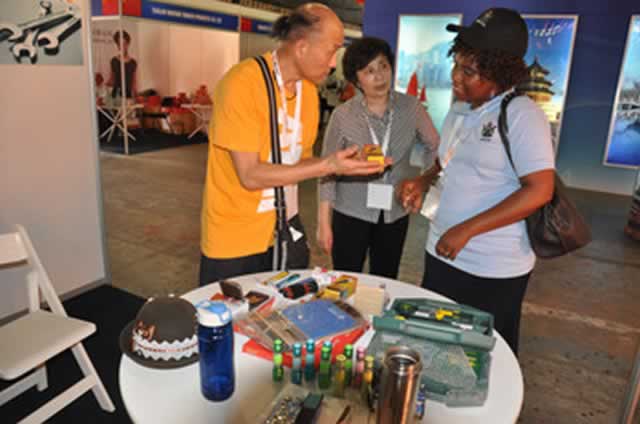
The Sunday News

 Mrs Eniya Mbozi (right) enquires about some Chinese products on offer at a stand belonging to Lin Ping and Tan Man at the Zimbabwe International Trade Fair exhibition on Wednesday
Mrs Eniya Mbozi (right) enquires about some Chinese products on offer at a stand belonging to Lin Ping and Tan Man at the Zimbabwe International Trade Fair exhibition on WednesdayRoberta Katunga Senior Business Reporter
HOTELS and lodges in Bulawayo made a killing during the Zimbabwe International Trade Fair week increasing rates by more than 300 percent, raising concern among exhibitors over the increases that they felt could project Bulawayo as an expensive destination.
A survey done by Sunday Business showed that all hotels and lodges spiked their accommodation rates in anticipation of high demand during the ZITF exhibition.
This move by hoteliers has sparked debate on whether Bulawayo stands to benefit or lose as it emerged that some exhibitors had to cut down the number of employees attending the fair as they could not afford the high costs of accommodation.
The survey noted that Bulawayo Rainbow which normally charges $148 bed and breakfast per night increased its rates to $380. Bulawayo Holiday Inn increased its rates to $297 per night from $155. Cresta Churchill raised rates from $105 to $165.
Various lodges also followed suit. Glen Lodge, one of the most established lodges in the city, raised from a modest $90 per night to $250. Another lodge, Montgomery, adjusted its rates from $70 to $225.
The Zimbabwe Tourism Authority and Hospitality Association of Zimbabwe, however, defended the move for those offering accommodation saying the law of demand and supply justified the action.
The law of demand and supply is the base to any economic understanding; it defines the effect that the availability of a particular product and the desire (demand) for that product or service has on price. Generally if there is low supply and a high demand, the price will be high.
ZTA chief operating officer, Mr Givemore Chidzidzi said Zimbabwe was not in a phase of price control and they let market forces play.
“When demand exceeds supply, as is the case during the exhibition, the prices are then determined by market forces. This situation is not unique to Zimbabwe or Bulawayo but it happens everywhere else in the world,” said Mr Chidzidzi.
Mr Chidzidzi said as ZTA they did not encourage the practice but understood the behaviour by businesspeople to increase their returns when an opportunity arose.
“Right now Bulawayo sits at a capacity in hotels ranging from ungraded to four star hotels of 749 rooms. This obvious short supply of accommodation has also led to the increase of development of lodges in the city that are permanently registered with ZTA,” he said.
He, however, urged hoteliers to be innovative in terms of pricing and determine which days have the highest demand and said it was imperative to increase activities throughout the year to maintain a steady stream of income instead of milking people during ZITF.
HAZ president Mr Tamuka Macheka concurred with the ZTA on demand and supply and said if one could not regulate demand it was difficult to put a framework.
“It is difficult to put a ceiling in terms of pricing because the service being offered differs and we allow customers to choose their own service. Of course providers of accommodation have to charge responsibly,” said Mr Macheka.
He said the same principle or model being used by hoteliers applied in airlines.
“We are cognisant of the fact that players need to justify their charges with the service they are providing,” he said.
Matabeleland Chapter Confederation of Zimbabwe Industries president, Mr Cletus Moyo said increasing accommodation fees during ZITF did not affect business or the image of the city and said it actually showed that business was booming.
“We should in fact, have more trade fairs or exhibitions of a similar nature,” he said.
Despite the justification by the authorities that oversee the hospitality sector, exhibitors expressed their disgruntlement over the high prices.
“As much as we understand that there is high demand for accommodation in Bulawayo right now, we feel that charging double the usual rate is reasonable, not thrice or four times considering that some of us will be spending at least seven days in Bulawayo,” said one exhibitor who spoke on condition of anonymity.
The exhibitor said his company was spending US$2 079 per employee for bed and breakfast at the Holiday Inn for the seven days that they were in Bulawayo.
Reports said many companies and Government departments had to cut on delegations citing high accommodation charges in the city during the event.
House owners have over the years exploited the loophole by accommodating some visitors who cannot afford the hotel rates.
Below is a table showing what some of the hoteliers were charging during last week’s ZITF week.


